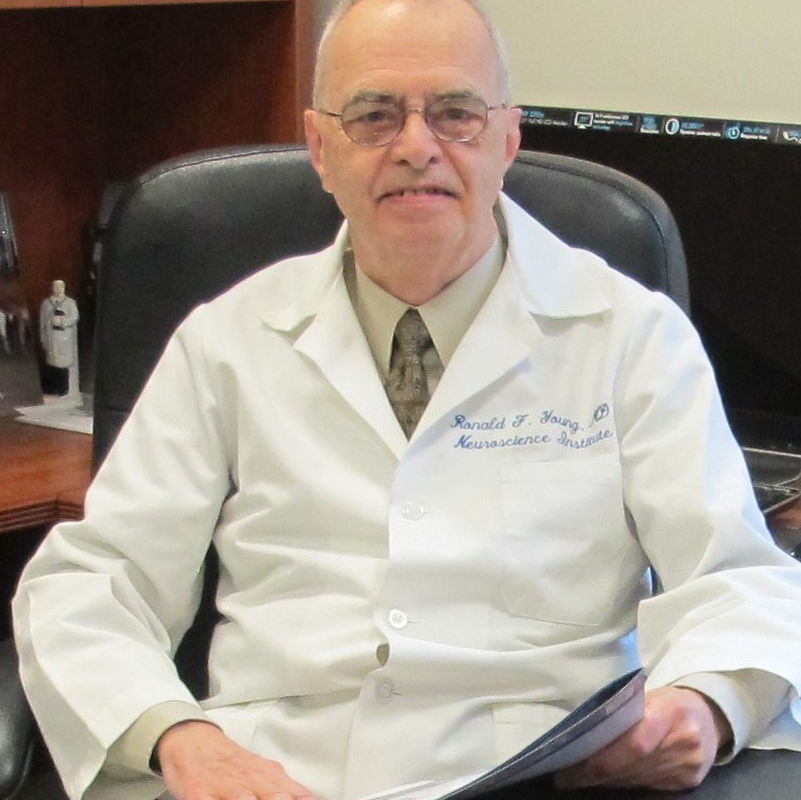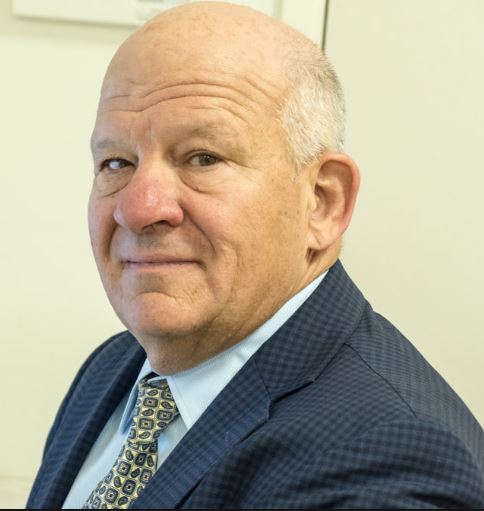
Dr. Ronald F. Young M.D
Neurosurgeon
2200 Lynn Road Thousand Oaks California, 91360About
Ronald F. Young, MD, works at a private practice in Seattle, Washington. He specializes in the treatment of movement and neurological disorders. A visiting Professor at the University of British Columbia, Dr. Young has won medals and other awards for his efforts overseas and with veterans.
Education and Training
SUNY Buffalo
Univ of Co Sch of Med, Denver Co 2000
University Of Colorado School Of Medicine 2000
Board Certification
American Board of Neurological Surgery
Family MedicineAmerican Board of Family MedicineABFM
Provider Details

Dr. Ronald F. Young M.D's Expert Contributions
What happens if you hit a nerve with a needle?
The answer depends on what kind and size needle, the size and function of the nerve involved, and why the needle is being inserted. A needle stick to a nerve may cause no harm at all but it can also damage the nerve either partially or completely. READ MORE
Need an opinion on stroke?
If by dizziness you mean vertigo or a sense that either you or things around you are spinning, you have a common but complicated problem. You should discuss with your doctor the results of the MRI. It may or may not be significant. There are neurologists who specialize in working out the diagnosis and treatment of dizziness. READ MORE
What are the symptoms of nerve damage in the shoulder?
The shoulder is the location of the brachial plexus and all of its branches. The nerves from spinal cord segments C5, 6, 7, 8, and T1 all go through the brachial plexus to supply feeling and movement to all of the muscles and other structures from the deltoid muscle on top of the shoulder and all of the arm from there down to all of the fingers. Nerve damage in the shoulder can cause weakness or paralysis of any of the muscles of the arm and hand and numbness or loss of feeling in any part of the arm or hand. I suggest that you seek a consultation with a neurologist or neurosurgeon if you are concerned about nerve damage in your shoulder. READ MORE
What is causing my headache and numbness?
Your headache and numbness may be due to a whole variety of neurological issues. There is no use in speculating on what may be causing them. You need to have a complete history and neurological examination performed by a neurologist. If the symptoms are severe, I suggest that you go to the nearest hospital emergency room for evaluation. READ MORE
Does a tumor always need surgery to be removed?
The simple answer to your question is NO, all brain tumors do not have to be removed. Many can be treated with a non-invasive method called Radiosurgery with a device called the Gamma Knife. You can look up Californiagammaknife.com for further information. Without knowing the kind of tumor and where it is located I cannot give you further advice as to whether surgery or radiosurgery or chemotherapy, etc. are indicated. READ MORE
Can a brain surgery cause speech defects?
Yes, brain surgery can cause speech defects. There are two definite speech areas in the brain usually located on the left side of the brain, except in some left-handed people, where the speech centers are on the right side. If the defect is present right, after surgery, it often will subside but it may take 12-18 months to do so. Speech therapy may be helpful to overcome the defect. READ MORE
Is there a surgery to treat ADHD?
NO, there is no surgery to treat ADHD. Some forms of deep brain stimulation (DBS) are being tested to treat depression but not ADHD. Perhaps in the future? READ MORE
Is there a surgery to treat symptoms of seizures?
There are a number of different surgical procedures to treat seizures depending on the origin of the attacks. A workup at a Comprehensive Epilepsy Center is required to determine the type of seizures and the location within the brain in order to determine if surgery is indicated and if so, what surgical procedure would be best for that particular type of seizures. Not all seizure types can be treated surgically and surgery is usually used only in patients who have "failed" medical treatment. READ MORE
Is weakness after a brain surgery normal?
Unfortunately, three weeks after brain surgery is not "a long period of time." We usually allow 12-18 months for full recovery depending on how severe the weakness is. In some cases the weakness may be permanent. Physical and occupational therapy may be helpful in the recovery process but patience is necessary to allow the brain time to recover. READ MORE
Is surgery required for a patient who has suffered from a stroke?
The term "stroke" is a very broad general term. There are many kinds of stroke for some of which surgery may be a useful treatment. The most common kind of stroke is blockage of an artery which carries blood to the brain. Recent, non-invasive treatments of such strokes using a small catheter inserted into the femoral artery at the groin and threaded up to the blocked artery may allow a clot dissolving medication to be injected to open up the blood vessel or in some cases the clot blocking the vessel can actually be removed. These treatments must be done within a few hours of the stroke to be effective. Other types of stroke such as bleeding directly into or on the surface may or may not respond to an open type of surgery. A neurologist and neurosurgeon experienced in all types of stroke treatment will be the best source of information about whether or not surgery is indicated in a particular stroke situation. READ MORE
I am having extreme fatigue and dizziness for the last one week. Could it be brain tumor?
While those symptoms could be due to a brain tumor there are many other things that should be evaluated first. I recommend that you see your family or primary care doctor first for a more detailed history, a physical examination and appropriate laboratory tests. Depending on the results of those evaluations, referral to a specialist such as a neurologist may be indicated if those tests do not reveal the cause of your symptoms. Such common things like high or low blood pressure, diabetes, viral infections and many other problems could explain your symptoms but a brain tumor while possible is not likely. If the evaluations I suggested do not explain you symptoms an MRI of the brain may be indicated. READ MORE
Can vertigo be treated?
Vertigo usually results in nausea, trouble with balance and sometimes headaches too. There are many causes of vertigo. Considering your age, although it is not clear how long you have had the vertigo, it is probably temporary but it can last along time. Acute labyrinthitis, an inflammation of the middle ear balance mechanism is a common, self limited cause of vertigo. Benign positional vertigo is mostly experienced with head movements or in certain head positions. Menier's Disease is a more serious and difficult to treat cause of vertigo which can be very debilitating. Some medications such as meclyzine may be helpful to treat the symptoms. I suggest that you have consultation with a neurologist, especially if you can find one who has experience in diagnosis and treatment of vertigo. READ MORE
Can a back injury cause neurological defects?
To answer your general question, yes, a back injury can certainly cause neurological defects but without knowing the specifics of the extent of your injury, what part of your "back" was affected it is impossible to give a more specific answer. I suggest that you have an evaluation by a neurologist or neurosurgeon to better define the type and extent of your neurological defects and what their likely cause might be. READ MORE
My sister lost her vision due to an accident. Is it possible to get the vision back?
Yes, it is possible she will regain her vision. Much depends on the time since the accident because recovery may occur as late as 18 months after the accident but rarely after that. An MRI scan might be helpful in finding the cause of the visual loss and helping to predict whether or not it will return. READ MORE
Can kids suffer from vertigo?
Yes, children can get vertigo. True vertigo results from a problem in the middle ear, vestibular balance mechanism and is often thought to result from a "virus" but in fact, there is little real evidence to support that conclusion. Of course tumors of the balance or vestibular portion of the 8th cranial nerve can cause dementia but in children such tumors are very rare. An MRI should rule out any tumors. In the absence of a structural cause of vertigo, treatment is usually symptomatic, trying to reduce the associated nausea and balance problems. Benign positional vertigo is common in adults and is usually self limited. I would recommend a pediatric neurologist to diagnose and treat such a problem. READ MORE
Is surgery necessary for herniated disk?
Whether or not surgery is "necessary" for a herniated disk depends on many factors. First off, what are the symptoms and what are the physical finding on examination. Is there only back pain ( or neck pain, depending on the location of the herniated disk} or is there also radiating leg pain (sciatica) or arm pain which might indicate nerve pressure. Abnormal findings on examination such as numbness or loss of feeling in the distribution of one or more nerve roots, weakness of a leg or arm or in the case of very large disk herniatiions, evidence of pressure on the spinal cord would tend toward a recommendation for surgery. The size or prominence of a herniated disk on an MRI scan is usually not the best indicator of whether or not surgery is indicated or whether the problem can be managed by conservative means such as physical therapy, modification of physical activity, use of anti- inflammatory medications, etc. A good medical history, physical examination and consultation with a surgeon experienced in spine surgery should be accomplished, in order to make such a decision. Be a little bit suspicious of physicians advertising themselves as "spine surgeons!" READ MORE
Recovery from craniotomy?
Recovery after craniotomy depends on the reason for the surgery. You are dealing with the after effects of your head injury and not after effects of the surgery, itself. Symptoms such as difficulty with concentration, poor memory, trouble performing sequential tasks, reasoning and emotional lability are common after head injuries. These symptoms can persist of several week or even several months and in rare cases, if the injury is very severe, may be permanent. I suggest that you discuss your concerns about these symptoms with your surgeon or neurologist. READ MORE
Areas of expertise and specialization
Faculty Titles & Positions
- Speaking for Peers and Patient Groups -
Treatments
- Cataracts
- Acne
- Diabetes
- Hearing Loss
- High Cholesterol
- Warts
- Actinic Keratosis
- Type 2 Diabetes
- Pain
- Seborrheic Keratosis
- Vascular Disease
Internships
- University of Minnesota
Fellowships
- SUNY Upstate Medical University
Professional Society Memberships
- American Academy of Neurological Surgeons, Congress of Neurological Surgeons, Western Neurological Society
Articles and Publications
- 80 Peer Reviewed Works
What do you attribute your success to?
- Enduring Drive to Advance the Field
Hobbies / Sports
- Literature, French Language, Opera, Photography
Favorite professional publications
- Journal of Neurosurgery
Dr. Ronald F. Young M.D's Practice location
Dr. Ronald F. Young M.D's reviews
Write ReviewPatient Experience with Dr. Young
Recommended Articles
- Laminectomy: Reasons for Having One and the Risks It Involves
What Is a Laminectomy?A laminectomy is a kind of surgery whose aim is to decompress the spinal cord. The lamina (the bone that constitutes spinal‘s vertebral arch) and bone spurs are removed during the operation. Both the lamina and bone spurs can compress your spinal cord leading to:...
- Treatment for Parkinson's Disease
Parkinson’s Disease: It Isn't EasyTony led a normal life just like many of us. He was approaching his fifth to sixth decade, and he was the head of an engineering department--capable of making decisions and recalling those decisions. But suddenly, communication with his wife and children was...
- Lobotomies in Other Countries
What is a lobotomy and why was it used?A lobotomy is a neurosurgical procedure used for the treatment of various psychological conditions, such as severe depression, mania, schizophrenia, etc. It was even used for the treatment of homosexuality.The idea of brain surgery started around 1890, when a...
- Recovery After a Laminectomy
Laminectomy is a surgical procedure done for the removal of the lamina, bone spurs, and ligaments that may be putting pressure on your spinal nerves and causing lower back pain. The procedure is said to be one of the most commonly performed back surgeries. Below is a detailed information on what...
- How to Prepare for a Laminectomy
Laminectomy is a procedure where a surgeon removes a part or more parts of your vertebrae or any ligaments on your spinal cord that exert pressure on the nerves. Laminectomy is said to be the most common back surgery performed for disability and pain. The following are some expectations before,...
- Scoliosis Symptoms and Causes
Scoliosis often occurs in kids below the age of puberty. Some of the most common signs of scoliosis happen to be the following:...
Nearby Providers
- Dr. Neda Heidari MD1801 Solar Dr Oxnard CA 93030
- Dr. Leslie D. Cahan MD2200 LYNN RD THOUSAND OAKS CA 91360
- Xin Sean Xin D.O.7230 Medical center dr West Hills CA 91307
- Dr. John A Lee M.D.1250 La Venta Dr Westlake Village CA 91361
- Dr. Anthony A Virella MD1250 La Venta Dr Westlake Village CA 91361
- Dr. Michael J Dorsi MD100 MOODY CT STE 200 THOUSAND OAKS CA 91360
Nearest Hospitals
SIMI VALLEY HOSPITAL & HEALTH CARE SERVICESl
2975 N SYCAMORE DR SIMI VALLEY CA 93065ST JOHNS PLEASANT VALLEY HOSPITALl
2309 ANTONIO AVE CAMARILLO CA 93010HOAG ORTHOPEDIC INSTITUTEl
16250 SAND CANYON AVENUE IRVINE CA 92618FOOTHILL REGIONAL MEDICAL CENTERl
14662 NEWPORT AVE TUSTIN CA 92780









